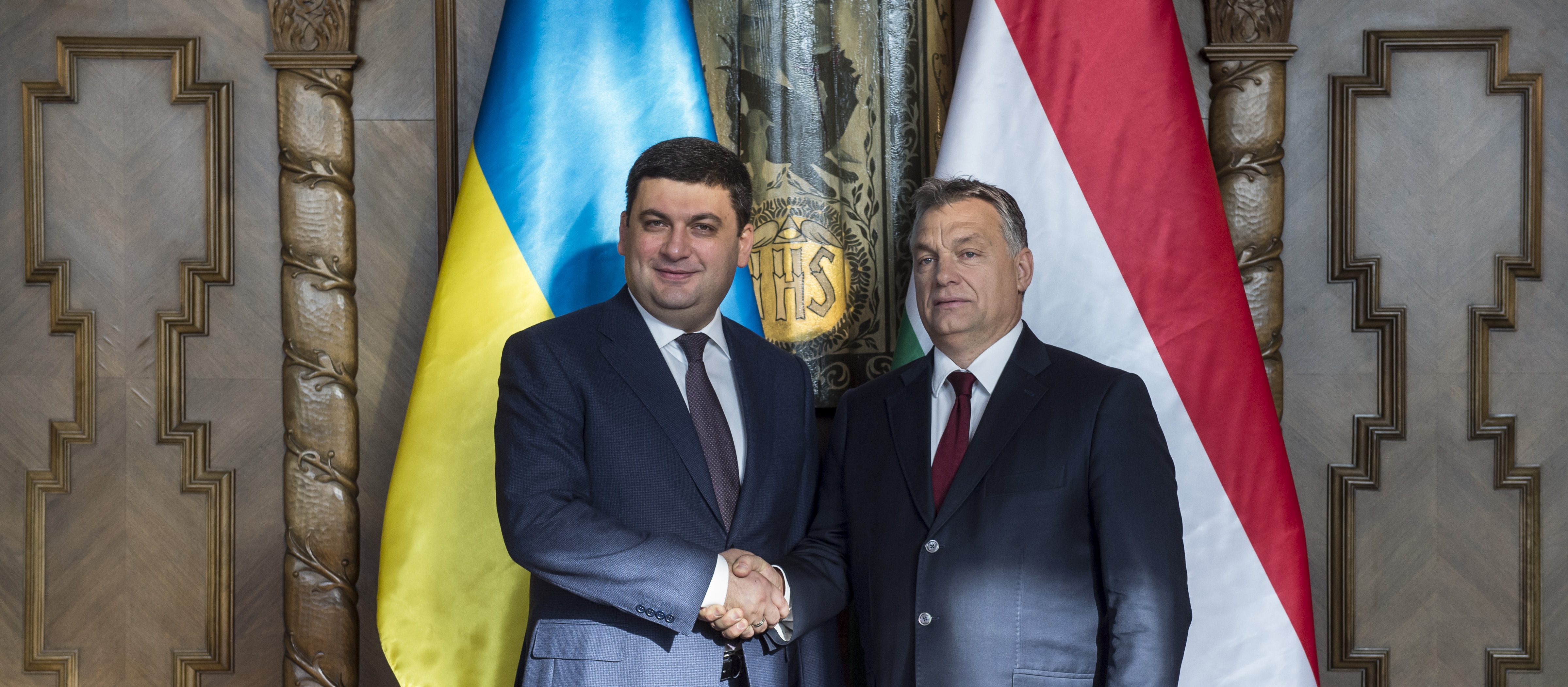
At a joint press conference, Mr. Orbán said that Ukraine’s goal is to be part of the Western world, and to occupy its well-deserved place in the community of the EU. He made it clear that Hungary supports Ukraine’s EU membership, although he noted that at present this issue is not on the agenda, as Ukraine has a few more steps to take before accession talks can begin.
He pointed out, however, that EU countries are “blocking” two issues which are fundamental for Ukraine: one of them is visa-free travel, while the other is the free trade agreement. The countries of the Visegrád Group support Ukraine on these two issues, he said, adding that Hungary sees granting Ukrainians visa-free travel to the EU as a moral issue.
The Prime Minister said that the EU has a moral duty to grant Ukrainians visa-free travel, after three difficult years which their country has had to endure, and which it has undergone in the name of European values.

The Prime Minister announced that, due to the EU’s “blocking” of visa-free travel for Ukrainians, Hungary has decided to allow Ukrainian citizens to obtain visas for travel to Hungary free of charge. This will take effect immediately, he said, and he asked his Ukrainian counterpart to look into when this could be reciprocally granted to Hungarians working in Ukraine.
He also emphasised that Hungary regards Ukraine’s sovereignty as the most important issue, that it respects it unconditionally, and that it is ready to give assistance to Ukraine in reinforcing its sovereignty. In his words, he said, Hungarians and Ukrainians feel that they share a common fate, and they see their own nations’ lives within a shared community of fate.
Referring to the agreement which had been signed, Mr. Orbán told the press that they agreed on the most important economic and infrastructure programme in the history of the two countries. Hungary is making EUR 50 million available for the launch and implementation of the programme, he said, adding that this year Hungary will offer HUF 2 billion for the development of the Ukrainian economy, and another HUF 5.2 billion next year.

Over the past two years trade between the two countries has suffered a major setback, which is linked to the economic sanctions imposed on Russia, he said. Overall there has been a 33 per cent decline in Ukrainian-Hungarian trade, he said, but the good news is that in the first eight months of 2016 there was an 11 per cent increase, which indicates that trade between the two countries has begun to climb back to former levels.
In the interest of turning this increase into a steady trend, the Hungarian government has agreed that by 2020 a Hungarian motorway will be extended as far as the Hungarian-Ukrainian border.
The Prime Minister also said that, after treating 20 injured soldiers in Hungarian hospitals this year, Hungary is ready to continue this assistance. At the meeting there was agreement that Ukrainians living in Hungary and the Hungarian national minority in Ukraine are special assets to both countries, and, Mr. Orbán said, “we are committed to the strengthening of these communities, and their educational and cultural identities”. The Prime Minister asked Mr. Groysman to support Hungarians living in Ukraine on issues which are important to them.
Prime Minister Groysman said that relations between the two countries are very positive, and there are good opportunities for enhancing cooperation. Those in power have an obligation to take advantage of these, he said, to ensure that cooperation is effective and successful – primarily for the benefit of the two countries’ citizens.

The Ukrainian prime minister added that for Ukraine national minorities are an asset, and Ukrainians are proud of the fact that there is also a Hungarian national minority living in their country. They would like all their citizens to be happy in Ukraine, and the planned joint efforts with the Hungarian government also serve this purpose, he said.
Mr. Groysman stressed that bilateral economic relations must also be reinforced, and the Ukrainian government is seeking to create all the conditions to make businesses successful in its country.
He said that on Friday he would attend the Hungarian-Ukrainian business forum together with his Hungarian counterpart, where they will tell the business community that even closer relations should be forged. Ukraine is implementing important domestic reforms, he said, and the signs of economic recovery are already emerging, with growth currently running at 1.8 per cent rate. He added that there are plans for a major privatisation programme, which the Hungarian business community is also welcome to participate in.
The Ukrainian prime minister told the press that in the near future there will be commemorations of the events which were set in motion in Kiev’s Maidan Square. The country is on an extremely difficult path, he said, and “peaceful Ukraine” is fighting for restoration of its independence, and an end to the aggression it is being forced to endure. Mr. Groysman thanked Hungary for supporting the preservation of Ukraine’s territorial integrity, the granting of visa-free travel, and its accession to the European Union.

He also thanked Hungary for its commitment to grant visas to Ukrainian nationals free of charge. This announcement will be very favourably received in Ukraine, he said, adding that this will also contribute to Ukraine being a good and reliable partner for Hungary, which can always count on his country’s support.
The Ukrainian prime minister closed his speech by saying that he believes in Hungarian-Ukrainian cooperation, and in the two countries being able to jointly achieve results within the family of European peoples.
Before the press statements, the two prime ministers had signed an aid credit agreement and a declaration of intent on infrastructure cooperation. The members of the Hungarian and Ukrainian delegations also signed agreements on sport and refurbishment of bridges on the River Tisza.

